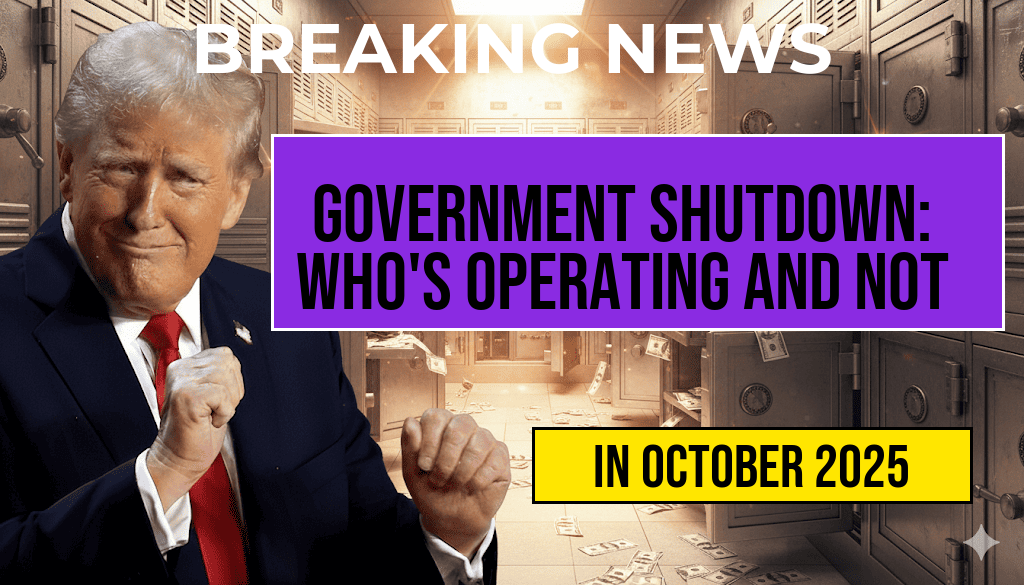The United States government entered a partial shutdown early Saturday after congressional negotiations failed to produce a funding agreement before the midnight deadline. Thousands of federal employees face unpaid time off or furloughs, while essential services like national security and public safety continue to operate under limited capacity. This shutdown impacts numerous agencies, with some maintaining operations through funding authorizations or emergency measures, and others halting all non-essential activities. Key departments such as Social Security, the IRS, and the Department of Defense have outlined specific operational statuses, illustrating the complex landscape of government functions during this period. As lawmakers remain at an impasse, millions of Americans are uncertain about access to benefits, government services, and the broader economic implications of the shutdown. This article provides a detailed agency-by-agency breakdown of who is operating and who is not, based on official government statements and expert analysis.
Government Shutdown Overview
The shutdown stems from a failure to pass appropriations bills for the upcoming fiscal year, primarily due to disagreements over funding levels and policy provisions. Under the federal budget process, agencies rely on annual appropriations to fund their operations. When these are not enacted, agencies must rely on existing funds, emergency measures, or cease operations altogether. The current shutdown affects a broad swath of government functions, with the most critical services remaining operational under legal obligations, while others suspend services until funding resumes.
Essential Agencies and Services Continuing Operations
Social Security Administration
- Operational Status: Fully operational
- Services Provided: Processing benefits, issuing payments, and handling inquiries continue as usual.
- Impact: Beneficiaries typically see no disruption unless their local office is closed for other reasons.
The Social Security Administration (SSA) is classified as an essential agency due to its role in managing retirement, disability, and survivor benefits. Its staffing levels remain largely unchanged, ensuring ongoing payments and customer assistance.
Internal Revenue Service (IRS)
- Operational Status: Limited operations
- Services Provided: Tax collection, processing of refunds, and taxpayer assistance are significantly reduced but continue for critical filings.
- Impact: Most refund processing and customer service lines are temporarily unavailable, but tax deadlines remain unaffected for now.
The IRS continues essential functions related to tax law enforcement and taxpayer support, although many services are curtailed during the shutdown period. Taxpayers should expect delays in processing and customer response times.
Department of Defense
- Operational Status: Largely maintained for national security and active military operations
- Services Provided: Military personnel remain on duty, and operations continue, but civilian employees face furloughs.
- Impact: Non-essential activities, including administrative functions and certain contractors, are suspended.
Defense agencies prioritize ongoing military missions, with legislative exceptions allowing active-duty personnel to continue their roles. Civilian employees involved in administrative tasks are furloughed unless designated as essential.
Transportation Security Administration (TSA)
- Operational Status: Fully operational
- Services Provided: Airport screening, security checkpoints, and transportation safety oversight continue uninterrupted.
- Impact: Airport security remains unaffected, ensuring passenger safety at airports nationwide.
The TSA is funded through the Department of Homeland Security and is considered essential, allowing it to maintain airport security operations despite the shutdown.
Agencies Facing Complete or Partial Closure
Federal Emergency Management Agency (FEMA)
- Operational Status: Continues core functions related to disaster response
- Services Provided: Disaster declarations, emergency management coordination, and critical relief efforts are ongoing.
- Impact: Non-essential administrative functions and grant programs are suspended.
FEMA prioritizes disaster response activities, which remain funded under existing emergency authorizations. However, administrative and planning activities face delays.
National Institutes of Health (NIH)
- Operational Status: Select essential research activities continue; many non-essential functions halt.
- Services Provided: Critical research projects and clinical trials proceed, but administrative and grant review processes are delayed.
- Impact: Ongoing research may face disruptions, and new grant applications are on hold.
NIH maintains a minimal level of operation to support ongoing health emergencies and critical research, but the majority of activities are paused during the shutdown.
Impacted Agencies and Services Ceasing Operations
| Agency | Status | Key Services Affected |
|---|---|---|
| U.S. Department of State | Shutdown | Consular services, visa processing, diplomatic operations |
| Environmental Protection Agency (EPA) | Shutdown | Environmental inspections, grants, research activities |
| National Park Service | Shutdown | Park closures, visitor services, maintenance |
| Housing and Urban Development (HUD) | Shutdown | Public housing programs, community development grants |
Many agencies have halted non-essential activities, leading to closures of national parks, suspension of grant programs, and delays in licensing and regulatory processes. The shutdown also affects thousands of federally funded projects across the country.
Economic and Public Impact
The shutdown’s immediate effects ripple across the economy, delaying government payments, disrupting federal contracts, and causing uncertainty among contractors and employees. Markets tend to react to such political standoffs, with analysts warning of potential economic slowdown if the impasse persists. Meanwhile, millions of Americans relying on government benefits, such as Social Security and Medicaid, continue to receive payments, though some administrative delays may occur.
Looking Ahead
Lawmakers remain at an impasse, with negotiations ongoing in Congress. The Biden administration has urged for a swift resolution to prevent further disruption, emphasizing that prolonged shutdowns harm economic stability and public safety. As discussions continue, the resilience of essential federal services provides some reassurance, but the uncertainty underscores the importance of resolving funding disagreements promptly.
Readers can follow updates from official sources such as govinfo.gov and reputable news outlets to stay informed about the shutdown’s developments and potential resolution timelines.
Frequently Asked Questions
What agencies are still operational during the government shutdown?
Essential agencies such as the Social Security Administration, Department of Defense, Transportation Security Administration (TSA), and IRS are continuing to operate despite the shutdown to ensure critical services remain available.
Which government services are affected by the shutdown?
Many non-essential services are temporarily paused or halted. This includes some administrative functions, grant programs, and processing of certain applications. Citizens may experience delays or disruptions in these areas during the shutdown.
Will Social Security payments be impacted during the shutdown?
Social Security payments are typically considered essential and will continue to be disbursed during the shutdown, ensuring that beneficiaries receive their benefits on schedule.
How does the government shutdown affect IRS operations?
The IRS will continue to process tax refunds and essential operations, but many non-urgent services and assistance centers may be temporarily unavailable until full funding is restored.
What should travelers expect at TSA checkpoints during the shutdown?
The Transportation Security Administration (TSA) remains operational, so airport security screenings will continue as normal. Travelers should still arrive early and be prepared for possible delays due to staffing levels.






